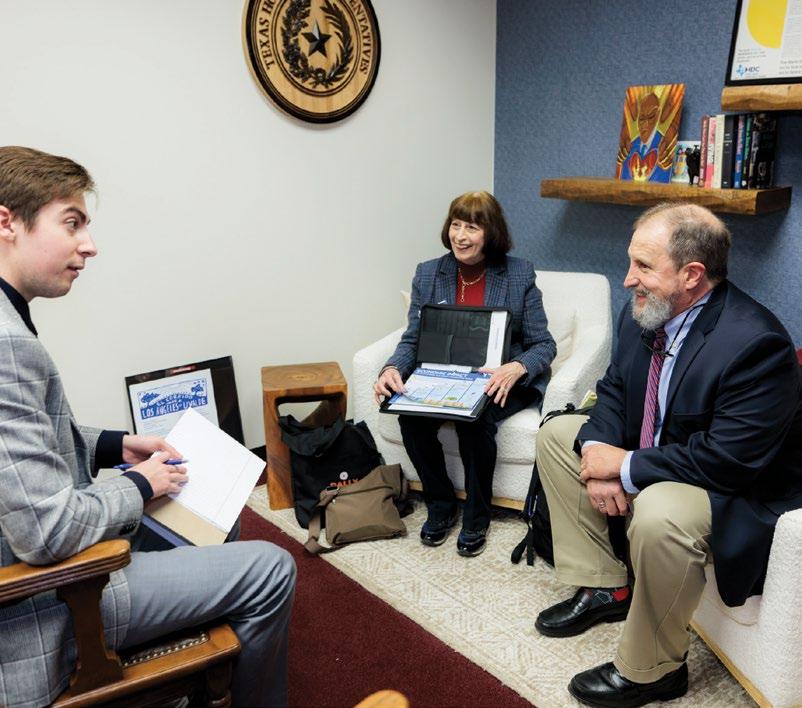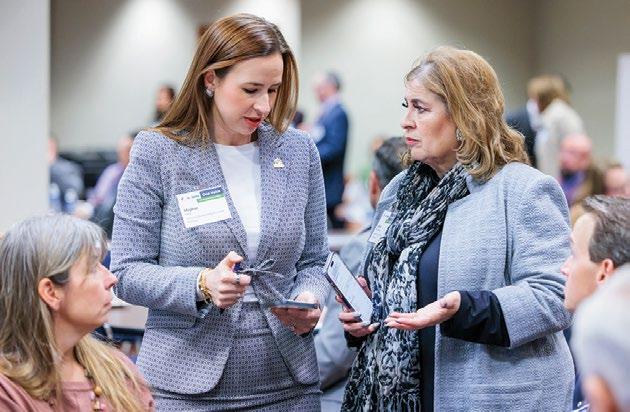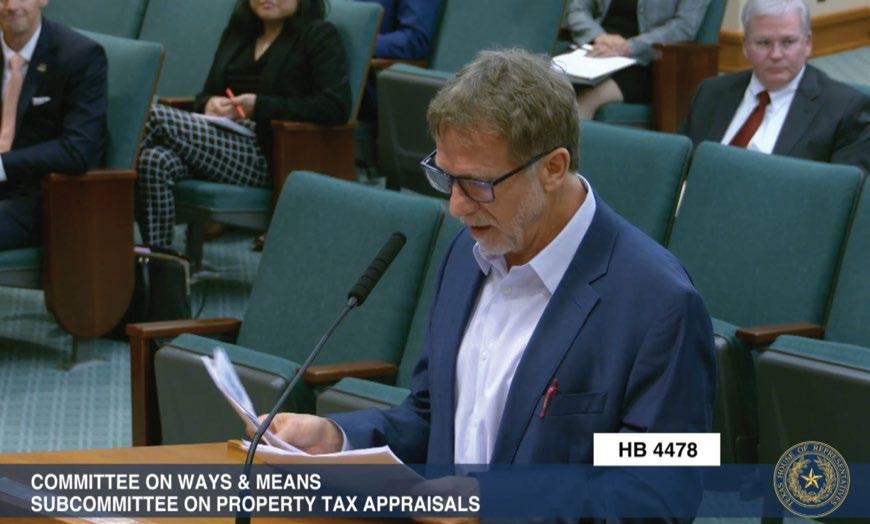
17 minute read
Texas' 89th Legislative Session: Where the Dust Settled
By Whitney Parra-Gutiérrez, TAAHP Policy & Regulatory Manager
The 89th Legislative Session began with a surge of optimism. The Capitol felt alive. Bill filings were up more than 11 percent from 2023, and affordable housing was part of the conversation from the start. Momentum was building as coalitions took shape, members stayed engaged, and long-standing issues finally received the attention they deserved. But as the weeks wore on, early energy gave way to gridlock. Committee hearings ran long, and packed agendas slowed progress. Even strong bills that cleared committees stalled in Calendars. Many bills with broad support and no fiscal note quietly ran out of time.
The Texas Legislature meets for 140 days every two years, and by Day 133, the shift was clear. Senate referrals to the House had increased by 78 percent over the prior session, while House referrals to the Senate had declined by 34 percent. The flow of legislation between chambers became uneven, and the ripple effects showed up in the numbers.
A total of 8,719 bills were introduced in the 89th Session, but the overall passage rate dropped from 15.5 percent in the 88th session to 13.9 percent in the 89th. However that decline was not uniform. The Senate maintained its pace, passing nearly 20 percent of its bills. The House, facing greater procedural delays and a heavier volume, saw its passage rate fall to 11 percent. The Senate’s consistency helped stabilize overall output in a session defined by timing challenges.
Of the 8,719 bills filed, only 1,155 were signed into law—a 13% passage rate. Governor Abbott vetoed 28 bills and announced a Special Session beginning July 21, with no housing-related items included in the initial agenda.
Even amid the delays and uncertainty, TAAHP’s advocacy moved forward:
• Two influential Committee Chairs each authored a bill championed by TAAHP
• All five of TAAHP’s priority bills passed committee (first time ever)
• Two of TAAHP's priority bills passed at least one chamber
• SB 2137, related to the removal of Education Quality Requirements in 9% housing tax credit applications, passed both chambers and is now law
TAAHP may not have won every fight, but it broadened its reach, moved key priorities forward, and ensured the industry’s voice remained strong. And in a session where process often stalled progress, TAAHP’s housing agenda stayed on course. That kind of impact comes from yearround advocacy, strong partnerships, and a deep bench of member-led policy leadership.
TAAHP's Efforts Began Long Before the Start of the Session
By the time the 89th Legislature gaveled in, TAAHP had spent every day since the last session adjourned advancing the work that would shape what came next. Staying engaged year-round is essential, especially since affordable housing and the tax credit program are not always top priorities for lawmakers. It’s imperative to focus on building relationships, sharing real-world solutions, and maintaining a constant presence in policy discussions.
In Fall 2024, TAAHP staff hosted “Affordable Housing 101” trainings for legislative staff, helping new and returning offices understand the basics before bill filing began. TAAHP’s lobby team worked to identify new allies—legislators who could become champions for affordable housing and help lead the conversation.
TAAHP is always looking for ways to bring more member voices into the policy process. After the 87th session, new subcommittees within the organization’s Government and Legislative Affairs (GALA) committee were established to expand participation and tap into the deep expertise that makes up the TAAHP membership base. Each group focuses on a specific issue area, votes on proposals, and sends recommendations to GALA for approval. Once adopted, staff carry those priorities forward.
After the 88th session, TAAHP introduced another tool for engagement—TAAHP ‘s first Legislative Town Hall. Held in October, it came after most bill priorities were set but still sparked valuable discussions that shaped the government affairs leadership team’s approach.
For the upcoming 90th session in 2027, TAAHP plans to host multiple town halls starting a year in advance. The goal is simple: give members more time, space, and opportunity to provide input on the final legislative agenda.

TAAHP 2025 Policy Agenda
Despite the gridlock and deadlines that shaped much of the 89th Texas Legislature, this session offered something just as important. It provided clarity. TAAHP’s leadership saw which policies resonate, how far strong ideas can go, and where TAAHP’s message is starting to gain ground—even when a bill does not make it across the finish line.
Each of the following bills helped advance the conversation around affordable housing in Texas and reflects a key pillar of TAAHP’s 2025 agenda. These were not reactive efforts—they were the result of months of preparation, strategic engagement, and direct input from our members.
To strengthen our case, TAAHP backed each proposal with original research, white papers, and educational infographics. Our commitment was clear: we would only advocate for legislation grounded in both on-the-ground experience and solid data. What follows is a look at the policies we championed, the progress we made, and the groundwork we laid for the future.
SB 2137 — Removing Educational Quality Requirements
SB 2137 was the only housing tax credit bill to pass both chambers this session. This bipartisan bill, authored by Sen. José Menéndez and sponsored in the House by Rep. Charles Cunningham, passed both chambers, and was filed without the Governor's signature - officially making it law. SB 2137 temporarily removes public school performance ratings from TDHCA’s scoring and eligibility criteria for the 9% Housing Tax Credit program in 2026 and 2027.
In doing so, it aligns housing policy with Texas’s evolving education landscape. With school choice expanding through SB 2 and the state’s A–F accountability system facing legal and legislative challenges, SB 2137 affirms that housing access shouldn’t hinge on outdated or unstable school ratings. The bill passed with bipartisan support and included a sunset provision and required TDHCA study.
TAAHP's Recent Legislative Success
Over the past four legislative sessions, TAAHP helped shape and, in many cases, lead the most consequential affordable housing policy reforms in Texas. Some of these bills were directly advanced by TAAHP (marked with asterisks). Others succeeded because TAAHP provided critical support, data, and testimony.
2019 – 86th Session
• HB 1973 – State Representative Letters**
• SB 493 – Two Mile Rule Exemption for Houston
• SB 1474 – Bond Program Reform
2021 – 87th Session
• HB 3833 – Appraisals for LIHTC Properties**
• SB 1984 – Reassignment of Carry Forward Bonds
• SB 2046 – TDHCA Noncompliance Reporting
2023 – 88th Session
• HB 1058 – State Housing Tax Credits**
• HB 2071 – Public Facility Corporations (PFC) Reforms**
• HB 1766 –Conditional 55% bond financing cap for 4% tax credit developments
• HB 4550 – Developer Cap Increase
2025 – 89th Session
• SB 2137 – Educational Quality Requirements**

SB 898 – Per Development Cap Increase
SB 898, authored by Sen. César Blanco and Rep. Joe Moody, would have raised the 9% LIHTC per-development cap from $2M to $3M, addressing rising costs and shrinking project size. The bill aimed to give TDHCA more flexibility to support more financially viable, resilient developments.
SB 898 passed the Senate but stalled in the House Intergovernmental Affairs Committee (IGA), significantly delaying its progress. Its companion bill, HB 1865, cleared IGA earlier in the session but also faced delays in reaching the House floor. In the end, SB 898 missed the May 15 midnight deadline by just minutes—we were only five bills away on the calendar. With just a little more time, the bill likely would have passed. TAAHP will continue to champion this bill next session.
HB 4478 — Standardizing Cap Rates for LIHTC Appraisals
HB 4478, by Rep. Chris Turner, would have given TDHCA authority to set cap rates for LIHTC appraisals—reducing litigation and bringing consistency statewide. Developed in partnership with the Texas Association of Appraisal Districts, the bill passed the House Ways & Means Committee with bipartisan backing. However, a delay in receiving its fiscal note stalled the bill, and it did not reach the House floor before time ran out.

HB 4045 — Clarifying Neutral State Representative Letters
HB 4045, by Chairman Cecil Bell, would have ensured that when a state representative submits a neutral letter on a 9% HTC application, it is treated the same as submitting no letter at all - allowing the local government's position to guide scoring. The bill made it onto the House floor list but was strategically pulled after a heated debate to avoid hostile amendments that could have undermined its intent.
HB 627 — Reforming the Resolutions of No Objection (RONO) Process
HB 627, by Rep. Philip Cortez, aimed to improve transparency and reduce arbitrary denials in the Resolutions of No Objection (RONO) process, while preserving local input. Though placed on the House floor list, the bill was withdrawn before debate after facing internal opposition from the House Republican Caucus, led by Rep. Valoree Swanson.
Legislative Wins TAAHP Helped Advance
While TAAHP advances its own legislative priorities, leadership is also deeply engaged in shaping other key bills that impact TAAHP members. TAAHP’s government affairs team works closely with legislators and staff—offering testimony, research, technical insights, and practical recommendations throughout the process.
These bills reached the Governor’s Desk:
HB 24: Limiting Zoning Protest Thresholds
This bill raises the threshold for triggering a supermajority vote on rezoning, requiring objections from 60% of adjacent property owners instead of 20%.
SB 840: Allowing Residential Use in Commercial Zones
Permits residential development in commercially zoned areas without a zoning change, effectively legalizing mixed-use or adaptive reuse projects in underutilized retail corridors
SB 15: Minimum Lot Sizes & Density Standards
SB 15 limits minimum lot size and density rules in high-growth areas, reducing barriers to smaller, more affordable homes and encouraging market-driven development.
SB 2477: Enable Office-to-Housing Conversions
Streamlines process for converting underutilized office properties into housing.
TAAHP Played Defense— And That Was a Win Too
This session, more than a dozen bills were filed that would have rolled back or complicated the tools that make affordable housing viable.
HB 293 — Requires State Representative Letters for 4% HTC Applications
Authored by Rep. Valoree Swanson, this bill would have required 4% LIHTC applications to secure a support letter from the district’s State
Representative. TAAHP strongly opposed the bill, with Past President Jean Latsha providing testimony against it. Although it passed out of committee, the bill ultimately died without reaching the House floor.
The Growing Fight Against Tax Exemptions for Affordable Housing
No issue drew more fire or attention this session than property tax exemptions related to affordable housing. Lawmakers filed 18 bills aimed at limiting or restricting the use of exemptions by Housing Finance Corporations (HFCs), Public Facility Corporations (PFCs), and Housing Authorities. Outside of the State Housing Tax Credit program, which is limited in funding, Texas offers little direct financial support for affordable housing. As a result, housing providers are increasingly relying on property tax exemptions to close financing gaps. This session made it clear just how critical those tools are and how vital it is to protect them.
The Backdrop: HB 2071
In 2023, the Legislature passed HB 2071, a major reform of Public Facility Corporations. It addressed longstanding concerns about “traveling” tax exemptions and imposed new accountability measures. It was a hard-fought win for the affordable housing industry—but it didn’t address HFCs.
In the aftermath, some Housing Finance Corporations began operating outside their jurisdictions, stepping into the space previously occupied by PFCs. That shift triggered new political scrutiny.
HB 21: The Fight That Found Us
In 2025, much of the same dynamic from the 88th session existed, but the interests of key committee chairs were clear. They wanted to not only end the problem of “traveling” tax exemptions related to HFC’s (which the industry supported), but they also wanted a full-scale reform of the program.
Rep. Gates filed HB 21, a comprehensive reform bill aimed directly at HFCs. Significant concerns about these reforms were raised by national investors and lenders about related impacts to HFCs and other housing programs.
TAAHP responded, securing key carveouts that:
• Preserved LIHTC tax exemptions
• Protected countywide HFC jurisdiction
Despite these improvements, the bill left behind ongoing legal uncertainty and signaled that the fight over tax exemptions is far from over.
A Stronger Coalition, A Harder Fight Ahead
Despite the result of HB 21, one of the most beneficial outcomes was the strengthening of our partnerships with organizations who have the same objective of protecting all affordable housing tools, including tax exemptions. TAAHP worked closely with the Texas Association of Local Housing Finance Agencies (TALHFA) and the Texas Chapter of the National Association of Housing and Redevelopment Officials (TXNAHRO) to defend the full spectrum of tax-exempt financing tools. The outcome reaffirmed that no one entity can protect these tools alone.
The Trend Is Clear—and Escalating
• 2023: PFCs.
• 2025: HFCs.
• 2027: Housing authorities?
Even though HFC tax exemptions were the primary focus this past session, several bills were filed with the intent of addressing the third form of affordable housing tax exemptions, those affiliated with Chapter 392 and Housing Authorities.
Looking toward the 90th Legislature in 2027, TAAHP leadership anticipates this will be where the continued attention on tax exemptions will lie. Recent rhetoric is clear: some legislators are already eyeing the next phase—renewed tax exemption bills with new restrictions on housing authorities and a universal “benefits test” that could fundamentally reshape tax exemption policy. This is a coordinated focus that has used broad corrections to close unique loopholes. TAAHP’s government affairs team will need to be even more prepared as it makes its plans for the next legislative session.
That said, TAAHP staff is not waiting until 2027. Affordable Housing site visits are already in the works and members are coordinating with local governments, commissioning research, and shaping TAAHP’s next strategy. But the success of this effort depends on the involvement of all TAAHP members.

What you can do now:
• Invite lawmakers to your properties
• Share resident impact stories
• Build local government allies
• Stay engaged in TAAHP committees
The next wave is coming. To protect current tools and create new ones that make affordable housing possible, TAAHP must lead the way— early, visibly, and together.
TAAHP Showed Up -–Every Step of the Way
The Texas Legislature moves fast—and often with little warning. One minute, a bill may be stalled in committee. The next, it can be on the Senate or House Floor being debated along with various amendments. In a session like that, TAAHP advocacy must be nimble— and it was.
Every talking point, every amendment, every meeting— it all starts with GALA and its subcommittees. That’s the engine behind TAAHP’s impact.
— Roger Arriaga, Executive Director, TAAHP
In committee rooms, floor galleries, inboxes, Zooms, and face-to-face meetings, TAAHP showed up wherever housing policy was being decided. Behind the scenes, the leadership team worked around the clock. A research request from a legislator might come in at 9:00 p.m. By morning, a subcommittee had reviewed the issue. By lunch, clear, actionable recommendations were delivered.
Testimony moved just as fast. Even with only a few hours' notice, there was always a member ready to speak on the industry’s behalf. At one point, a Senator called minutes before heading to the floor asking for data. Within moments, the GALA network was activated. Members picked up the phone and called his office directly providing the information he needed. The Senator and his staff later told us how grateful they were, not just for the information, but for the speed and clarity provided.
That kind of responsiveness made TAAHP more than advocates. It made TAAHP a trusted resource for strategy, solutions, and real-time support when it mattered most.
Rally Day: A Capitol United

On February 20, 2025, more than 70 advocates from 58 organizations met with 85 lawmakers and staff, including every member of the House Intergovernmental Affairs and Senate Local Government committees.
This year, Rally Day was moved from March to February to make an earlier, stronger impact—and it paid off. TAAHP staff and members came prepared with materials and personal stories, and left with renewed recognition, including a resolution from Senator José Menéndez declaring it Affordable Housing Day in the Texas Legislature. Thank you to everyone who showed up and made it count.
Shifting the Narrative
This session, one of our biggest wins wasn’t just policy. It was public perception. This year, TAAHP worked with a public relations firm. The result: legislators and staff echoed our talking points, cited our graphics, and sought our help reframing complex housing issues. In a crowded advocacy space, TAAHP stood out as a trusted source for information and solutions.
TAAHP Alliances Expanded
Behind every major housing policy effort this session was something even more powerful: collaboration. Slowly but surely, housing policy is drawing in broader allies, more engaged stakeholders, and unlikely partners ready to help solve the housing crisis facing our state.
Who Testified with Us?
• 35 distinct companies/organizations either testified or registered in support:
10 associations
6 local governments
6 advocacy/nonprofit organizations
13 private-sector companies
• 12 companies submitted written comments in support of various bills
• Total of 47 distinct companies/organizations engaged in some form of support (testimony, registration, or comment)
Case in Point

How HB 4478 Brought New Allies to the Table
Affordable housing properties faced unpredictable, inflated appraisals due to inconsistent cap rate methods across appraisal districts. TAAHP proposed shifting cap rate development authority to TDHCA, which already regulates LIHTC properties and collects statewide data.
When Real Stories Break Through
Some of the most powerful moments this session did not come from headlines. They came from TAAHP members showing up with the truth in hand. When TAAHP member Tim Lang testified before the House Property Tax Subcommittee, he did not just talk about rising appraisals. He showed them. Holding the documents in hand, he laid out the numbers clearly.
“Last year’s appraised value, after protest, was $5.6 million. This year, it’s $18.4 million.”
The room froze. Eyebrows lifted among the subcommittee members. An audible “woah” broke out among staffers and stakeholders in the audience. Rep. Candy Noble leaned forward, visibly surprised. “Did that triple?” she asked. “It did,” Tim replied. She shook her head and said quietly, “Wow. I thought that’s what I heard.”
That moment cut through the noise. It turned data into impact. And it is exactly why TAAHP asks members to testify because no one tells this story better than those living it.
The Outcome
The bill stalled due to a late fiscal note—but it left a legacy:
• A strong alliance with appraisal districts
• Credibility on property tax policy
• A vetted solution ready for 2027
The Takeaway
HB 4478 showed how real policy change starts—with members, with facts, and with smart, collaborative advocacy.

Beyond the 89th Legislative Session: Building Toward the 90th
The 89th Legislature did more than test TAAHP’s policy priorities. It tested TAAHP’s presence, the process, and TAAHP’s purpose. Through it all, TAAHP demonstrated something essential: even in the most gridlocked and unpredictable environment, strategic, member-led advocacy can break through.
That momentum does not stop on the last day of the Legislative Session, or Sine Die. In fact, the road to the 90th Legislative Session in 2027 has just begun. Pressure on tax exemptions is growing. Questions around housing tax credits, local control, and housing finance are only intensifying. And the need for affordable housing has never been more urgent. But before closing the chapter on the 89th Legislative Session, TAAHP extends its sincere gratitude to all participants who helped with Rally Day, Committee and Subcommittee work, educating our elected officials, and providing written and spoken testimony. Thank you.
The path forward is evident and TAAHP’s leadership is getting ready.










